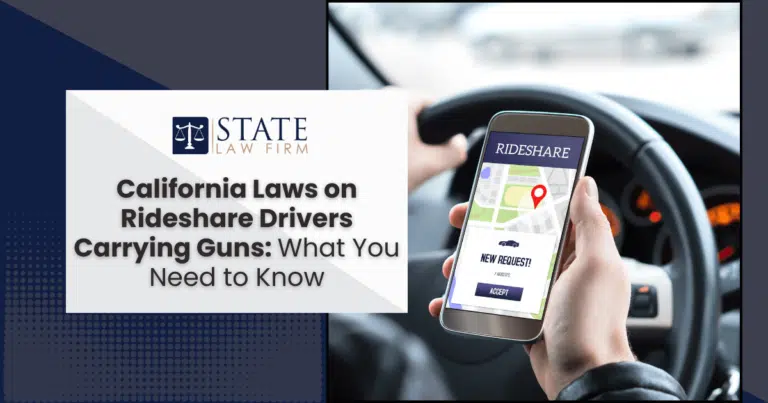In an era where ridesharing services like Uber and Lyft have become integral to our daily transportation needs, questions about safety and legal rights often arise—especially when it comes to firearms. Rideshare drivers face unique challenges on the road, from navigating unfamiliar areas to managing interactions with passengers. For some drivers, the question of whether they can carry a firearm for self-defense becomes critical.
California’s firearm laws, however, are among the most stringent in the nation. With over 39.1 million residents (source: U.S. Census Bureau), the state enforces strict regulations on gun ownership and concealed carry permits, making it essential for rideshare drivers to understand both their legal obligations and the policies of the companies they work for.
This guide dives into the intersection of California’s gun laws and rideshare regulations, exploring how state laws and corporate policies affect drivers’ rights to carry firearms. We’ll also cover the responsibilities drivers must consider when transporting passengers while armed. If you’ve been involved in a rideshare-related legal matter, don’t hesitate to visit our Sherman Oaks premises liability lawyers page for expert legal support.
By understanding the legal framework and practical considerations, rideshare drivers can make informed decisions that prioritize safety for themselves and their passengers.
Understanding the Legal Framework for Rideshare Drivers in California
California’s laws regarding rideshare drivers are complex, particularly when it comes to firearm possession. Rideshare drivers operate as independent contractors rather than employees, as clarified in a California Supreme Court ruling. This classification influences their rights and responsibilities, including firearm policies.
Under state law, carrying a firearm requires strict adherence to regulations, including obtaining a concealed carry permit (CCW). Drivers must also navigate the policies of the rideshare companies they work with, which often ban firearms in vehicles during service.
Key Points for Drivers:
- Rideshare drivers must comply with both California firearm laws and corporate policies.
- Legal rights vary depending on the classification as a contractor.
- Violations can result in legal repercussions, such as fines or losing the right to carry firearms.
Pro Tip: Always review your local county’s concealed carry requirements and confirm if rideshare driving is considered valid grounds for obtaining a permit.
The Current Status of Gun Ownership and Concealed Carry in California
California has some of the most stringent gun laws in the nation, designed to regulate firearm possession and concealed carry. As of 2023, only about 2.4% of Californians hold a concealed carry permit, compared to over 10% nationally. This highlights the difficulty of obtaining a CCW in the state.
Requirements for a Concealed Carry Permit in California:
- Demonstrate “good cause” for carrying a concealed weapon.
- Complete a firearms training course approved by the county sheriff.
- Undergo a thorough background check.
Self-defense laws in California also play a significant role in determining when and how firearms can be used. The state operates under a “duty to retreat” standard, meaning individuals must avoid confrontation whenever possible before resorting to force.
Pro Tip: For rideshare drivers, a strong case for obtaining a CCW might involve proving a consistent need for personal protection due to high-risk working conditions.
Rideshare Companies’ Policies on Firearms: What Are They?
Rideshare companies like Uber and Lyft maintain strict no-firearms policies for both drivers and passengers. These policies aim to enhance safety for all parties but often leave drivers feeling vulnerable, particularly during late-night shifts or in unfamiliar areas.
Uber’s Firearms Policy:
- Prohibits drivers and passengers from carrying firearms while using the app.
- Violators risk permanent deactivation of their accounts.
Lyft’s Gun Policy:
- Enforces a similar no-weapons rule across all U.S. markets.
- Drivers are required to agree to these terms before accessing the platform.
Why These Policies Matter:
- Violating corporate policies can result in job loss, even if state laws permit firearm possession.
- Drivers need to weigh their personal safety concerns against the rules set by these companies.
Pro Tip: If you’re considering carrying a firearm, consult an attorney to understand how these policies align with state law and your rights as a driver.
How California Laws Impact Rideshare Drivers’ Rights to Carry Firearms
While California gun laws allow for concealed carry under strict conditions, rideshare drivers face unique challenges. The state does not exempt drivers from company policies, meaning they must comply with both the law and their employer’s terms.
Legal Implications to Consider:
- Carrying a firearm without a CCW is a misdemeanor offense in California.
- Even with a CCW, company policies may lead to deactivation if you are caught carrying a weapon.
- Self-defense claims involving firearms often require extensive legal justification.
Pro Tip: Keep a non-lethal self-defense tool, such as pepper spray or a stun gun, in your vehicle as an alternative to firearms. These options are legal in California with fewer restrictions.
The Responsibilities of Rideshare Drivers When It Comes to Firearms
Carrying a firearm as a rideshare driver comes with significant responsibilities, both legally and ethically. Ensuring the safety of passengers, complying with the law, and respecting company policies are all crucial.
Safety Obligations:
- Secure firearms in a concealed holster to prevent accidental discharge.
- Avoid discussing firearms with passengers to maintain a professional environment.
Liability Issues:
- Accidents or incidents involving firearms can lead to civil liability for drivers.
- Improper storage or use of a firearm could result in criminal charges.
Pro Tip: Regularly review firearm safety training materials and consult with legal professionals to stay updated on your rights and responsibilities.
Conclusion
Navigating the intersection of firearm laws and rideshare policies in California can be challenging for drivers. By understanding the legal framework, corporate policies, and personal responsibilities, you can make informed decisions that protect your safety and livelihood. If you’re facing legal challenges as a rideshare driver, the experienced attorneys at State Law Firm are here to help. Reach out to us for personalized guidance and representation tailored to your unique situation.
Your safety and peace of mind are our priorities—let us help you navigate these complex issues with confidence.


